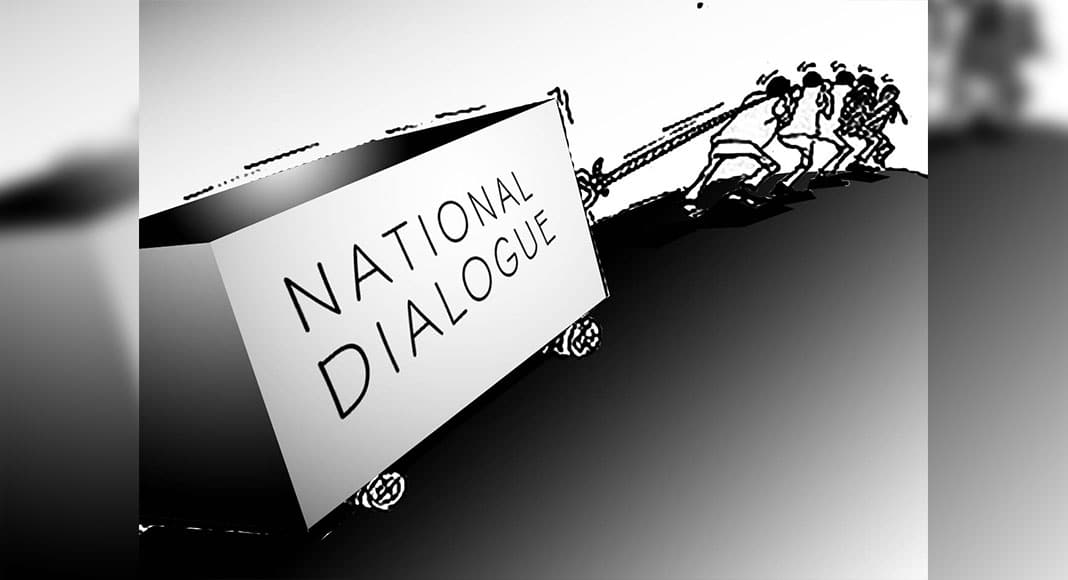
Ethiopia’s national dialogue process entered a critical phase this week with the commencement of a week-long session wherein representatives comprised of different segments of the residents of the capital Addis Ababa identify agendas on which consultations will be held. The participants are also slated to choose from among themselves representatives that will join other individuals similarly selected from regional states and other stakeholders for a dialogue to be held at the national level. Although the launching of the actual dialogue after a long-drawn process of electing the participants is supposed to mark a seminal moment in Ethiopia’s troubled history, the public’s low enthusiasm for it speaks volumes about the fractures that threaten to unravel the nation and the herculean efforts required to mend them.
The national dialogue process was set in motion in late 2021 with the establishment of the Ethiopian National Dialogue Commission (ENDC) by Parliament, which entrusted it with the mission of creating conducive conditions for national consensus by identifying the root causes of deep division and discord in Ethiopian society through research and public dialogues. Following the conclusion of the consultations by the elected delegates the commission is expected to present their recommendations to Parliament, the government and other relevant organs as well as to design an implementation monitoring system. If properly undertaken the national dialogue can go a long way towards addressing Ethiopia’s complex and longstanding challenges through inclusive and participatory discussions among various stakeholders. However, the process has not been without its priorities and challenges, which need to be carefully navigated to achieve successful and sustainable outcomes.
One of the primary priorities of the national dialogue process must be to promote unity, reconciliation, and social cohesion among the country’s diverse ethnic and political groups. Ethiopia is a multi-ethnic and multicultural society with a history of intercommunal tensions, conflicts, and grievances. The national dialogue provides an opportunity for different groups to come together and seek common ground to promote understanding and reconciliation. The national dialogue process should also focus on tackling the root causes of conflict and instability in Ethiopia. Through open engagement with diverse stakeholders, some of whom are armed groups and thus require guarantees about their physical safety, the national dialogue process can help identify the underlying drivers of conflict, promote accountability, and develop sustainable solutions to build a more peaceful and inclusive society. In addition, it ought to aim at strengthening democratic governance, respect for human rights, and the rule of law in Ethiopia. Through inclusive discussions on constitutional reforms, electoral processes, and institutional mechanisms, it can help build a more responsive, transparent, and broad-based political system that reflects the aspirations and needs of the Ethiopian people.
Needless to say there are a number of challenges that must be addressed to ensure the dialogue’s effectiveness and credibility. One such challenge is the trust and confidence deficit among diverse stakeholders with differing interests, perspectives, and grievances. The proliferation of militarized conflicts in large swathes of the country that make genuine dialogue unviable and concerns about the transparency of the process and the independence of some ENDC’s commissioners and the representatives taking part in the dialogue have robbed the entire process of integrity in the eyes of a not inconsiderable portion of the general public and political actors and led them to conclude that the process is destined to fail. Another glaring deficiency of the dialogue is the absence of representation of certain regional states, namely Tigray and parts of Amhara, and opposition parties, raising justifiable doubts over its legitimacy. Logistical, operational, and capacity constraints are further challenges that have dogged the ENDC and impeded its effectiveness.
Aside from these challenges the national dialogue process must navigate political complexities, vested interests, and power dynamics that can hinder progress and consensus-building. Political actors, parties, and elites may seek to instrumentalize the dialogue process for narrow political gains or to maintain their influence and control. Managing spoilers, addressing elite capture, and mitigating political manipulation are essential challenges that require robust governance, oversight, and accountability mechanisms to safeguard the integrity and credibility of the national dialogue process.
Ethiopia’s national dialogue process holds immense potential for promoting unity, reconciliation, and sustainable peace in a country grappling with complex challenges and historical grievances. By prioritizing inclusivity, conflict resolution, democratic governance, and respect for human rights, the national dialogue process can serve as a vital platform for fostering dialogue, building consensus, and advancing peaceful solutions to Ethiopia’s most pressing problems. However, the process also confronts a range of challenges, including building trust, ensuring inclusivity, navigating political complexities, and addressing logistical constraints. If these challenges are not dealt with through proactive measures, strategic planning, and sustained commitment from all stakeholders, the process may well flounder and even fuel more conflicts that exacerbate the very problems it is intended to resolve.
.
.
.
#Overcoming #Challenges #Impeding #National #Dialogue
Source link











